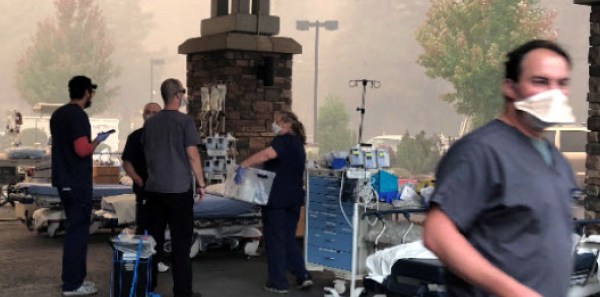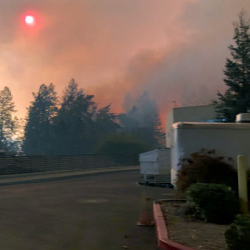
The town of Paradise, California, burned to the ground on Nov. 8, 2018, in the Camp Fire. It was the most destructive and deadly wildfire ever recorded in the history of California. The risk of fire has always been there. The state is always heading into, living through, or recovering from a drought. Brush fires occur at the end of every summer. Fire has always been a part of life in California. However, large destructive fires are no longer an anomaly. The fire season has evolved into something to be feared, as each new season is worse than the last.
The Camp Fire was well underway as I walked across the parking lot of Feather River Hospital to start my ED shift. Strong winds brought in the scent of smoke and fire. Reports said the gusts were up to 60 mph. That sounds about right. Retrospectively, I can say those were the signs of a destructive wildfire closing in on our hospital, but at the time, I was completely oblivious—and so was everyone else. It was business as usual. Patients were checking into the emergency department. The operating room was running cases. Hospitalists were making rounds. The cafeteria was still serving breakfast.
Evacuation

By 9:07 a.m., the sun was no longer visible
The fire started about five miles east of the hospital. It spread very fast. Within 90 minutes, embers were falling in the ambulance bay, and the order came through to evacuate. The day had barely started. There was only one intubated patient, and the rest were well enough for discharge.
The ambulance bay was an egress point for the hospital. As staff emptied the hospital, a long line of gurneys snaked its way through the emergency department. There was no time to print off electronic health records. There were no paper charts like in days of old. All the patients had were their ID bracelets and personal effects. It would have been nice if their medical information was encoded into their ID bracelets, but we’re a long way off from that kind of technology.
There were about 60 patients and a limited number of ambulances. Critical care patients were evacuated first. When the last ambulance was gone, hospital personnel volunteered to transfer the remaining patients. They drove into the bay, and we loaded up their cars as fast as we could.
Smoke began to extinguish the sun’s light (see photos). It was obvious that the fire was getting close because the horizon was glowing. Surprisingly, there was no panic. There were no egos. People worked very well together. The hospital was empty in 45 minutes.
The only escape route was down a narrow two-lane road that was surrounded by fire. It led through miles of dried-up pines. Law enforcement directed us onto the road even though traffic was gridlocked. I learned after the fact that cars had collided with one another in the dense smoke. Burning trees had fallen across the road. Car engines had stalled from the lack of oxygen. Burning vehicles sat abandoned on the road.
The middle of a raging fire is not bright like a campfire. It’s black and red. Thick black smoke fills the air. The sun is gone. Visibility is no more than a few feet. The only source of light is a red glow from the surrounding fire. It’s a little piece of hell on Earth.
Reality sank in. Escape was impossible. Burning to death seemed to be an absolute certainty. The only unknowns were how bad it would hurt and how long it would take. They say there are no atheists in foxholes. I’d say that holds true in a raging fire.
I learned that there’s a certain peace that comes with accepting death as your fate. Ironically, in that moment, my thinking cleared and I remembered my daughter. I couldn’t leave her without a mother, so I returned to the hospital. The parking lot was made of asphalt and wouldn’t burn. For now, it was safe. My plan was to shelter in place and try to evacuate later.
Pages: 1 2 3 | Single Page






2 Responses to “Notes From Emergency Physician Working When the Camp Fire Threatened Hospital”
March 19, 2019
Marianne CannonAwful scene,and very challenging times, for you ……. and similar here in Australia during our worsening wildfire seasons.
I wonder if ACEP might take a role in advocating around the causes of worsening natural disasters , despite the root cause being made “political” by certain groups .
As a 25 year member I was delighted to see the gun vested interest groups being challenged by those of us who clean up after the shooters mess, and we are -after all – the experts in disaster and environmental medicine .
“Men argue and Nature Acts ” Voltaire (sign in San Francisco )
April 4, 2019
Abigail PolzinGreat article. Thank you for sharing. Thank you for your dedication to your patients and community too.